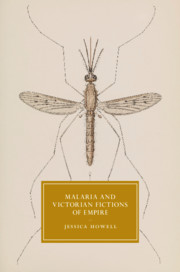Book contents
- Malaria and Victorian Fictions of Empire
- Cambridge Studies in Nineteenth-Century Literature and Culture
- Malaria and Victorian Fictions of Empire
- Copyright page
- Contents
- Figures
- Acknowledgments
- Introduction
- Chapter 1 Nationalism and Acute Malaria in Transatlantic Fiction
- Chapter 2 Malaria and the Imperial Romance
- Chapter 3 Malarial Feminisms
- Chapter 4 The Boy Doctor of Empire
- Chapter 5 Rewriting the Bite
- Coda
- Bibliography
- Index
- Cambridge Studies in Nineteenth-Century Literature and Culture
Chapter 1 - Nationalism and Acute Malaria in Transatlantic Fiction
Charles Dickens and Henry James
Published online by Cambridge University Press: 14 December 2018
- Malaria and Victorian Fictions of Empire
- Cambridge Studies in Nineteenth-Century Literature and Culture
- Malaria and Victorian Fictions of Empire
- Copyright page
- Contents
- Figures
- Acknowledgments
- Introduction
- Chapter 1 Nationalism and Acute Malaria in Transatlantic Fiction
- Chapter 2 Malaria and the Imperial Romance
- Chapter 3 Malarial Feminisms
- Chapter 4 The Boy Doctor of Empire
- Chapter 5 Rewriting the Bite
- Coda
- Bibliography
- Index
- Cambridge Studies in Nineteenth-Century Literature and Culture
Summary
- Type
- Chapter
- Information
- Malaria and Victorian Fictions of Empire , pp. 29 - 69Publisher: Cambridge University PressPrint publication year: 2018



